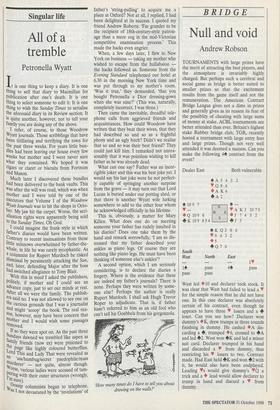BRIDGE
Null and void
Andrew Robson
TOURNAMENTS with large prizes have the merit of attracting the best players, and the atmosphere is invariably highly charged. But perhaps such a cerebral and social game as bridge is better suited to smaller prizes so that the excitement results from the game itself and not the remuneration. The American Contract Bridge League gives not a dime in prizes and generally gives as its reason its fear of the possiblity of cheating with large sums of money at stake. ACBL tournaments are better attended than ever. Britain's highest stake Rubber bridge club, TGR, recently hosted a tournament with large entry fees and large prizes. Though not very well attended it was deemed a success. Can you make the following 44 contract from the event?
Dealer East # A 5 4 • Q 8 6 • A K6 # A 2 Both vulnerable 3 2 # 10 9 7
—
N
V —
W E • A KJ 1075 • Q 109 8
S
• J 7 4 3 2
4K 109 8
5 4
# J 3
K Q J 8 6
• 9 4 3 2
• 5
# Q 7 6
South
West North East
119
14 pass pass pass 44 pass
West led 410 and declarer took stock. It was clear that West had failed to lead a for the simple reason that he did not have one. In this case declarer was absolutely certain of his contract, even though he appears to have three V losers and a 4 loser. Can you see how? Declarer won dummy's 4K, drew trumps in three rounds finishing in dummy. He cashed •A dis- carding a 4, trumped 46, crossed to #A and led +2. West won 4K and led a minor suit card. Declarer trumped in his hand and discarded a V from dummy, thus restricting his V losers to two. Contract made. Had East held 4K and won 42 with it, he would also have been endplayed. Leading Vs would give dummy's NPQ a trick and a • lead would allow declarer to trump in hand and discard a V from dummy.


















































































 Previous page
Previous page